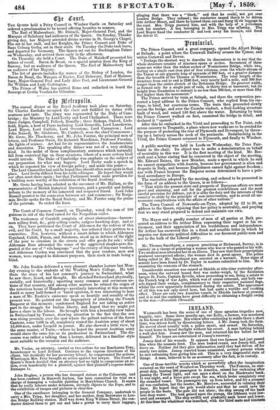thr 311rtropolio.
The annual dinner at the Royal Academy took -place on Saturday. Sir Charles Eastlake occupied the chair and fulfilled its duties with neatness and taste. The Army was represented by the Duke of Cam- bridge ; the Ministry by Lord Derby and Lord Chelmsford. There were three Judges, Campbell, Pollock, Romilly ; three Bishops, Oxford, Lich- field, Ripon, a host of Peers including Lord Granville, Lord Lansdowne, Lord Ripon, Lord Carlisle, Lord Overstone, Lord Carnarvon ; Lord John Russell, Mr. Gladstone, Mr. Cardwell, were the chief Commoners ; Mr. Grote, Mr. Thackeray, and Mr. John Forster, the principal men of letters, and Professor Owen, Sir Roderick Murchison, Professor Faraday, the lights of science. Art had for its representatives the Academecians and Associates. The speaking after dinner was not of a very striking kind. In the midst of those complimentary sentences which naturally fall from oratorical lips on these occasions, others of a more serious kind would intrude. The Duke of Cambridge was emphatic on the subject of our preparation for what may happen. Lord Derby made a speech in which he repeated his view of foreign policy ; and made this point= The Lord Chancellor had said he hoped they should often meet again in that place. Lord Derby differed from his noble colleague. He hoped they.would not often meet there again ; but that Parliament would make provision for a building more worthy of the exhibition of the Royal Academy.
Mr. Grote having been selected as the successor of Mr. Hallam, as the representative of British historical literature, paid a graceful and feeling tribute to the memory of his lamented and respected friend. Lord John Russell pointed to the connexion between art and commerce ; SirBenja- min Brodie spoke for the Royal Society, and Mr. Forster sang the praise of the painters. So ended the feast.
The Court of Common Council, on Thursday, voted the sum of 100 guineas in aid of the fund raised for the Neapolitan exiles.
The tradesmen of Cornhill complain of street obstructions—barrow- men selling fruit, &c., girls selling combs, cadgers hawking dogs, and so on. They have petitioned the Court of Aldermen for the redress of this evil, and the Court, by a small majority, has referred their petition to a committee. Not, however, without a smart debate in which Alclainen Copeland, Cubitt, Finnis, and Salomons, stood up in defence of the right of the poor to circulate in the streets and offer goods for sale ; while Alderman Rose advocated the cause of the aggrieved shopkeepers dis- gusted at the use of " vile language " and the rivalry of itinerant vendors, and Alderman Carden was convinced that the poor vendors, men and women, were engaged in dishonest purposes, their stock in trade being a blind.
Mr. John Ruskin delivered a very pleasant chamber lecture last Mon- day evening to the students of the Working Men's College. He told them the story of his last summer's journey to Switzerland, what he: saw there, heard, and thought. He sketched Switzerland physically, socially, and historically ; upsetting many common and erroneous no- tions of that country, and among other matters he related the origin of the notorious house of Hapsburg—peculiarly interesting at this moment. Amid so many half-formed or 'bated opinions, it was interesting to hear a man of Mr. Ruskin's eminence speak so heartily and sensibly of the present war. He pointed out the impropriety of attacking the French Emperor at this moment ; condemned England for not taking an active part in the struggle for Italian liberty, and hoped that we might yet have a share in the labour. He brought with him a beautiful view taken in Switzerland by Turner, drawing attention to the fact that the sun was rising precisely over the spot where the gallant natives of the forest Cantons, some 1400 in all, completely routed the Austrian army of about 15,000 men, under Leopold in person. He also showed a little view, by the same master, of Turin,—where he hoped the present Austrian army would share the same fate as its predecessor in Switzerland. The dis- course was rather a talking than a lecture, delivered in a familiar style moat suitable to the occasion and the audience.
Mr. Voules, an attorney, carried on two actions for one Bosehanna Fray, housekeeper to Lord Zetland. Contrary to the express directions of his client, but decidedly for her pecuniary behoof, he compromised the actions. Whereupon Mrs. Fray brought an action against her lawyer. The Court of Queen's Bench decided that an attorney had no right to compromise an ac- tion, even beneficially for a plaintiff, against that plaintiff's express desire. Damages ls.
John Hughes, a person who has damaged statues at the Colosseum, and has been confined in Hanwell Asylum, has been committed for trial on a
taeof damaging a valuable painting in Marylebone Church. It seems he really labours under delusions, strongly objects to the Pope, and to the exhibition of images and pictures in churches.
One of the omnibuses belonging to the General Company, undertook to carry a Mrs. Tripp, her daughter, and her mother, from Bayswater to Lon- don Bridge Railway station. Half way down King William Street, the con- ductor desired them to get out and take a porter to carry their luggage, alleging that there was a " block," and that he could; not get over London Bridge. They refused ; the conductor caused theen to be driven into Arthur Street, and there he turned them out and flung di eir luggage in the road. Mrs.' Tripp pursued him, and with the help of a policeman took his number. A box belonging to Mrs. Tripp was nrissing. The Lord Mayor fined the conductor 31. and took away his licen0, and fined the driver 1/.


























 Previous page
Previous page